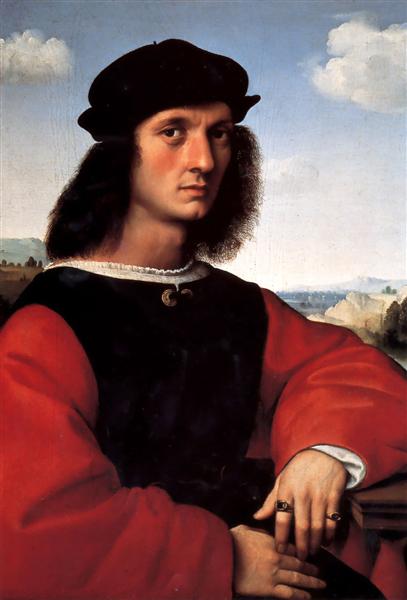Description
The "Portrait of Agnolo Doni", painted by Raphael in 1506, stands as a sublime manifestation of the Italian Renaissance, an era characterized by the intersection between reality and idealization. Agnolo Doni, a prominent Florentine merchant and patron of the arts, is the protagonist of this work, which not only reflects his social status, but also the technical mastery and deep psychological understanding that Raphael applied in his portraits.
When looking at the portrait, the first thing that strikes you is the careful composition that manages to balance the man’s figure with the space around him. Doni seems to emerge from the shadows, illuminated by a soft light that defines his features and accentuates his ornamental dress, which is a clear testimony to his privileged position. The rich brown tones of his jacket, contrasted with the white of the shirt, embrace the figure, creating an atmosphere of dignity and distinction. This use of colour not only highlights the richness of his attire, but also reinforces the introspective character of the portrait, focusing the viewer’s attention on the expression on Doni’s face.
Rafael, known for his ability to capture the essence of his subjects, portrays Doni with a serene yet enigmatic face. His gaze, fixed on the viewer, evokes a mix of confidence and thoughtfulness, challenging the audience to contemplate the inner life of the character. This is a characteristic trait of the artist, who often sought to go beyond mere physical representation, delving deeper into the psychology of his subjects. The way Rafael handles volume in Doni’s face and hands demonstrates his mastery of chiaroscuro, a technique that uses contrasts of light and shadow to give depth and realism to the human figure.
The inclusion of the background in the portrait is also noteworthy. This is a hazy, diffuse landscape that does not compete with the central figure, allowing the focus to remain on Doni. The smooth transition from the background to the figure reflects Raphael’s perception of the environment as an extension that complements his sitter’s identity. Also, the empty space at the top of the painting gives a sense of spaciousness, avoiding a feeling of confinement and allowing visual breathing room around the figure.
Interestingly, the Portrait of Agnolo Doni forms part of a broader association with the Portrait of Doni's Wife, the Portrait of Maddalena Doni, also painted by Raphael around the same time. This dome of couple portraits highlights not only Raphael's artistry as a portraitist, but also his ability to capture the duality of marital and social life in 16th-century Florence. This visual dialogue between the two paintings adds a layer of meaning to the work, reflecting the interrelationship between the subjects and the social context of their time.
In conclusion, the “Portrait of Agnolo Doni” is more than just a portrait; it is a work that encapsulates the spirit of the Renaissance, Raphael’s artistry, and the exploration of the individual in his social context. With his masterful use of color, astute composition, and deep psychology, Raphael not only succeeds in immortalizing his subject, but also invites viewers into the world of Agnolo Doni’s thoughts and emotions. This painting, accentuated by its exceptional technique and historical background, continues to be a source of admiration and inspiration in the art discourse.
KUADROS ©, a famous painting on your wall.
Hand-made oil painting reproductions, with the quality of professional artists and the distinctive seal of KUADROS ©.
Painting reproduction service with satisfaction guarantee. If you are not completely satisfied with the replica of your painting, we will refund 100% of your money.

